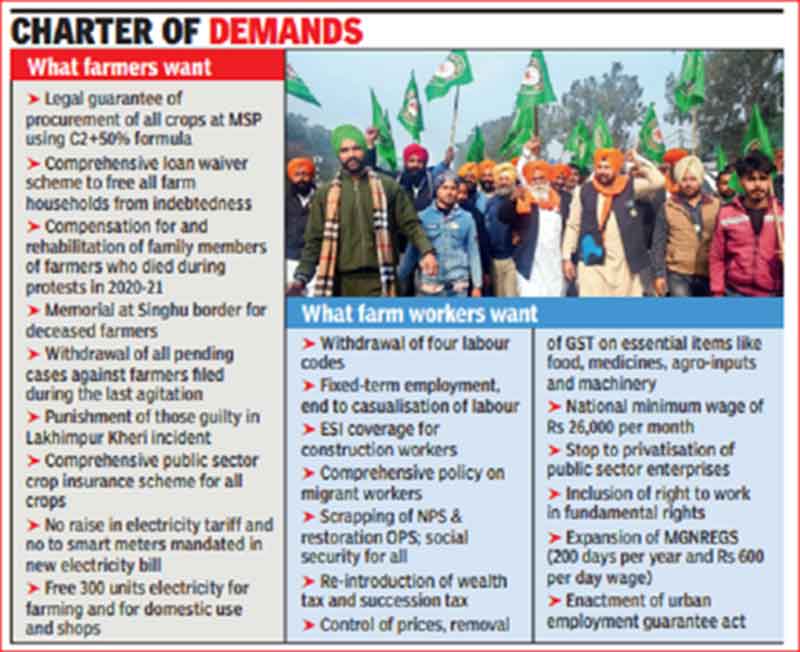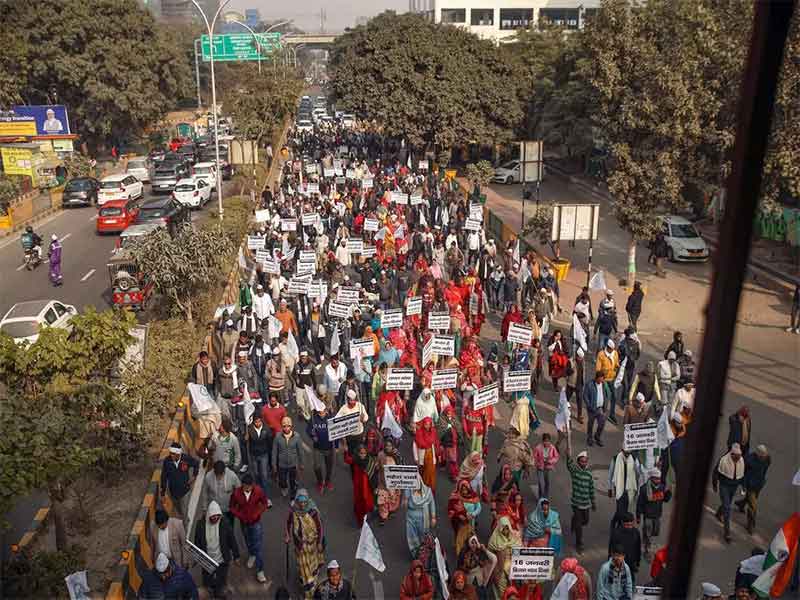
Introduction
It is rare for any legislation to become the rallying point of such large-scale and prolonged opposition as the three farm laws enacted together this year in India have become. The biggest farmers’ movement of recent times in India has emerged to protest against this ‘kala kanoon’ or black laws as these three laws have been repeatedly labeled by the movement of farmers.
The demand of the farmers’ movement for repealing these laws is also supported by several other sections of society. The three laws have rather pompous, pretentious titles but essentially seek to change the existing systems of farm production ( giving a push towards facilitation of contract farming) as well as storage and marketing of farm produce. Several eminent experts have lent their support to the key demand of the farmers’ movement for the repeal of these three laws. (R1)
Need and Framework of Comprehensive Analysis
Hence a comprehensive analysis of the many aspects and impacts of these three highly controversial farm laws is clearly needed. However to appreciate the implications of these three laws it is important also to look at the background and perspective of the wider farming situation in India and world. Without such a perspective the full implications of these three laws cannot be fully realized or understood.
So we start with this wider perspective within which the three laws need to be located and then look at various specific aspects of these laws like those relating to impact on farmers, implications for food security etc. Finally, we also need to look a little beyond the present debate on three farm laws to examine the policies we actually need.
Wider Crisis in Farm and Food System
There is a deep and widespread crisis of world farming and food systems linked mainly to the quest of powerful corporate interests to dominate these systems. These powerful interests, who seek not just very high profits but also dominance at various levels, are able to secure the collusion of several governments and key persons in policy and implementation. Together they make a very powerful combination.
They promote policies which relentlessly increase the sale of their expensive seeds and inputs, breaking the self-reliance of farmers and increasing their dependence and costs, regardless of adverse impacts of excess of these inputs on environment, while at the same the corporate interests also try relentlessly increase their grip on crop processing, trade and marketing to get a very large share of the total market receipts.
The key to securing guarantee of high corporate profits is to secure dominance at various levels, and also to secure legal base of this dominance. Hence there have been endless new laws of patents, trade, farming contracts in recent years.
Their machinations create increasing problems for family farms ,or small and medium farmers in many countries, as they are increasingly brought under pressure to increase their farm-expenses while their share of market receipts is reduced by a greater share going to corporate interests. The big companies and traders increase their share while farmers lose out.
The ever-increasing greed for more profits and higher market share on the part of big corporate interests also plays havoc with the objective of providing safe and healthy food to all, ending hunger and malnutrition.
Incredibly all this has been taking place on a vast scale in the name of development and progress, involving much manipulation. To make the system based on manipulation work, the system tries to co-opt some of the bigger and influential farmers, while governments keep announcing some temporary concession or relief for farmers, all the more so at election times when political parties vie with each other for this, but the basic trend of big corporate interests increasing dominance of food and farming systems, while marginalizing the bulk of small farmers , harming environment, health and sustainability continues. From time to time exploited farmers unite to demand justice, but unable to challenge the bigger forces , often their demands have rather narrow aims.
In addition there is the impact of multilateral and bilateral trade treaties, or other international and trade treaties by which food and farming systems are impacted. Here too the richest countries , in flagrant violation of the principle of correcting historic injustice, as well big agribusiness companies use these treaties and agreements to inflict further injustice and constraints on farmers of developing countries.
All this has been experienced in the context of farmers of India as well, the overwhelming majority of whom are small and medium farmers who have been reeling under the combined impact of fast increasing costs, marketing problems and escalating debts. Compulsions of electoral democracy prompted many governments to create some protective structure for them, but this too has been under the threat of trade agreements ( notably the WTO) and big corporate interests wanting a wider and unrestricted role for their expansion. They would like to have a legal guarantee for this before making bigger investments.
It is in this wider context that the debate on three farm laws should be seen. The current ruling regime is known to be very willing to push corporate interests, particularly of some crony capitalists considered to be very close to the ruling regime.
Impact on Farmers
One of these three laws relates to facilitating a much bigger role for contract farming . However the worldwide overall experience of small farmers and family farms regarding contract farming for big business concerns has been that of increasing tensions, (as they have to follow many conditions, losing their freedom), increasing costs ( as companies foist expensive inputs and technologies on them ) and feeling cheated time and again ( as companies make arbitrary decisions on grading their produce or reject it due to not meeting stringent, unfair standards).(R2) The recently enacted law to promote contract farming has attracted more specific criticism also for terms biased in favor of corporate interests, and for leaving dispute resolution outside normal civil court jurisdiction.(R3).
The other two laws seek to create a new framework of untaxed, unrestricted purchases by private business outside the area of officially designated market areas for farm produce (APMCs or Agriculture Produce Marketing Committees.), while at the same time removing existing restrictions on excess stocking and hoarding of even essential, staple foods by private traders and companies. These have been rightly criticized by farmers as a strong signal of moving away from government protected and regulated MSP ( officially announced Minimum Support Price) based system. On the other hand, the government has said time and again in its defense that it has no intention of dismantling the APMC-MSP based existing system ( which plays a rather limited effective role in the entire country as a whole but a much more dominating role in the green revolution states like Punjab and Haryana). Yes, the government may not officially announce dismantling of this system, but the farmers say rightly that its recent laws send strong signals of gradually moving away from this by providing unrestricted, untaxed new marketing avenues to big business which can spread fast.
Hence farmers have good reason for concluding that the three laws create a framework for moving away from a reasonably protective system to one dominated by big business interests having close links with ruling regimes, not even giving farmers the protection of normal civil courts if things go wrong with them, making the situation very uncertain and difficult in times of rising costs.
Impact on hunger , food security of poorest people
In conditions of widespread poverty and low purchasing power of a large number of households, there is no guarantee that market by itself would give high priority to producing adequate staple food needed for keeping away hunger and malnutrition. So this has to be ensured by a protective system based on MSP- government procurement-PDS ( public distribution system) and nutrition schemes. But when the government moves away from protective farm and food system to one dominated by big agribusiness interests of national and global food/farming system, with huge capacity to hoard and speculate, then both production and marketing will move away from reducing hunger to maximizing profits. The new trends unleashed by these laws move towards profiteering and speculation , that too in increasingly globalized systems. As more production takes place in conditions governed by contract system and dominated by big companies with global reach, production will be pushed by global profits and speculation and not by the needs of hungry and malnourished people in the country.
Impact on sustainability and environment protection
The present condition of Indian agriculture, particularly in so-called leading green revolution areas, is not at all good from the point of view of sustainability and environment protection. The situation certainly needs to be improved. But the trends unleashed by the new laws are likely to lead to further deterioration rather than any improvement in this important context. Cropping patterns and methods of production need to be in keeping with the needs of soil health and water conservation as well as other aspects of protection of environment and bio-diversity. But contract farming dictated by big companies just trying to maximize their profits pays scant regards to all this, often imposing highly resource-extractive cropping patterns and technologies, as their profits ignore social and environmental costs and count only cash costs and earnings. Agribusiness companies operating in global contexts for profit maximizing are notorious for their tendency to loot and scoot, as they plunder the resources of a region and then move away to a new area, leaving behind ravaged land and depleted water aquifers.
Impact on states and decentralization
There has been a strong feeling that under the impact of global and national corporate interests, the central government intrudes rather too heavily in areas like agriculture for which decisions should instead be taken at the level of states and panchayati raj ( rural decentralization) units. This trend increases with these three overbearing new farm laws. A more specific complaint is that state earnings from APMC/mandi taxes will decrease and development work supported by these earnings will suffer too, this too at a time of overall financial crisis in many states.
Impact on democracy and parliamentary procedures
These three farm laws have been also criticized as undemocratic as the necessary consultations with state governments, panchayati raj institutions, farmers’ organizations and independent experts were not held. These were introduced first as ordinances, objectionable in itself. Then the process of referring to parliamentary committee, which would have still provided one way of consultations with stakeholders, was also ignored. Then the passing of law in the upper house or Rajya Sabha had peculiar undemocratic features which were opposed by opposition parties and attracted several adverse comments. (R4)
Amendments or Repeal
As even government ministers and representatives have admitted, in the course of negotiations, that amendments are needed in these laws, another issue of debate has been whether farmers’ movement should accept amendments , or stick to its demand for repeal of laws. So far the farmers’ movement has been steadfast in asking for repeal, which is a well-justified stand. Supporting this stand a letter sent by ten eminent economists to the Agriculture Minister has stated, “ amending a few clauses will not be sufficient to address the concerns rightly raised by farmers…We appeal that the government withdraw these acts.” This unanimous view of these very senior economists, who have served in very prestigious government-supported and other institutions and are also known for their commitment to justice and public interest related issues, is thus very similar to the view of the farmers’ movement. ( R1)
Wider Issues
Beyond the debate on these laws, several issues need to be addressed. There is a strong need for agricultural progress based on justice and protection of environment, a social-ecological approach. (R5) Solutions have to be found in a much wider paradigm than one limited mainly by narrow economic concerns.(R6) Welfare and equality aspects of landless rural households should also get adequate attention. (R7).
We end by recommending strongly for immediate repeal of these three controversial farm laws, lifting of all cases against farmer activists, followed in due course by much wider measures for resolving the rural crisis on the basis of justice and environment protection.
References
R1—Serious concerns from economists regarding the recent Farm Acts, which merit their repeal—Letter dated December 17 2020 from Prof. D. Narasimha Reddy, Prof. Kamal Narayan Kabra and eight other senior economists to the Union Minister for Agriculture and Farmers’ Welfare
R2—Why small farmers lose in contract farming, by Bharat Dogra—Newsclick, August 25, 2020.
R3—The ground has fallen out from beneath the farmer’s feet– by K.T.S. Tulsi and Tanessa Puri— The Hindu December 8, 2020.
R4—Hard bargains and the art of policymaking—by M.A. Madhavan,The Hindu December 3, 2020.
R5—Social agro-ecology is the key to the real progress and security of food and farming systems–by Bharat Dogra-Countercurrents.org—November 25 2020.
R6.—To resolve the farming crisis we need a different paradigm—by Bharat Dogra—Countercurrents.org—December 9, 2020.
R7.—Amid an important farmer debate, don’t forget the woes of India’s landless workers—by Bharat Dogra—The Wire.in—November 30.
Bharat Dogra is a journalist and author who has contributed around 9000 articles and around 400 books and booklets in Hindi and English. His reporting from remote villages has been recognized in the form of several awards.
SIGN UP FOR COUNTERCURRENTS DAILY NEWSLETTER















































